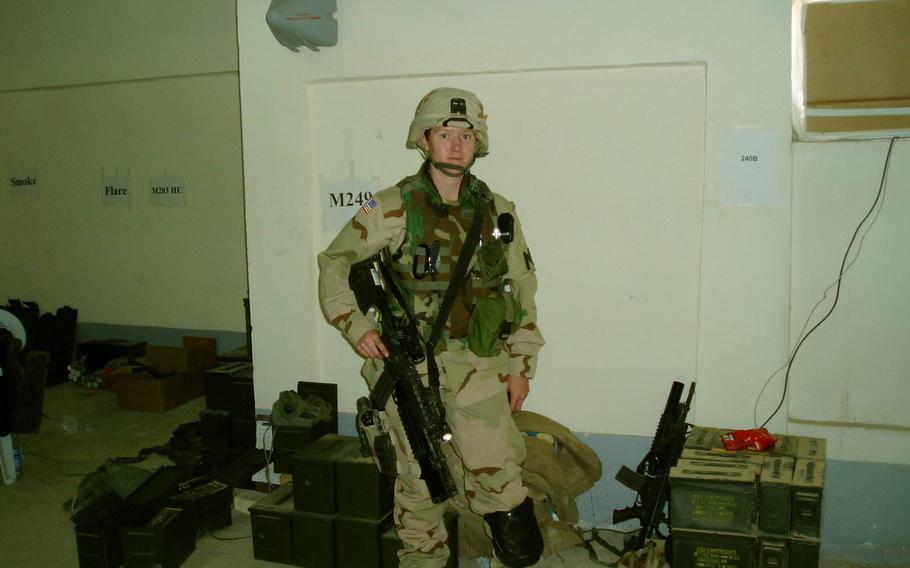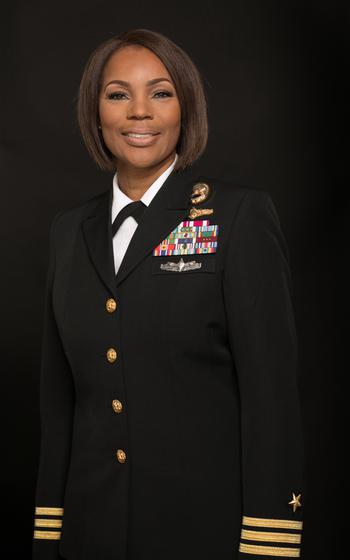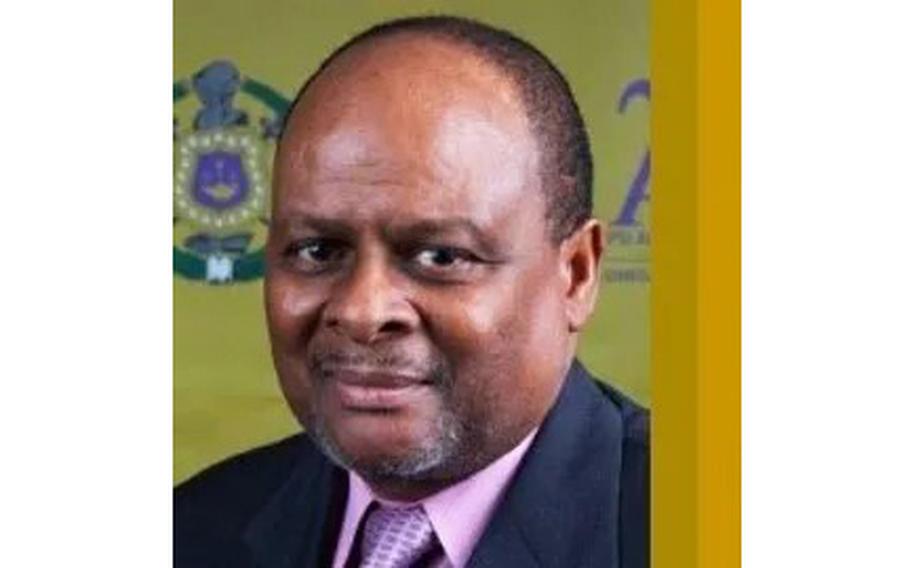The Pentagon is seen on Oct. 21, 2021. (Robert H. Reid/Stars and Stripes)
WASHINGTON — Dawn Halfaker was leading a military police platoon as an Army second lieutenant in 2004 when she was critically wounded in a Humvee while on patrol in Iraq.
“I was on the wrong end of a rocket-propelled grenade, which took my right arm and caused a lot of other injuries,” said Halfaker, who underwent 10 surgeries at Walter Reed National Military Medical Center in Maryland.
At 26, she was medically discharged yet undaunted in her ambition to continue working in the military — but now as a civilian. After a stint as a technology researcher for a defense agency, Halfaker gambled on starting her own business.
She used her disability checks and savings to launch a one-person company in 2006 offering technology services to the Defense Department, which was in the middle of integrating digital services in most operations.
“Succeeding at government contracting is about how you define your company and its focus,” said Halfaker, who in 2021 sold Halfaker and Associates to Science Applications International Corp. for $250 million.

Dawn Halfaker suffered a life-threatening injury that ended her Army service. She is shown here in 2004 during deployment in Iraq. As a civilian, she launched a firm providing technology to government agencies. She sold the business in 2021 for $250 million. (Dawn Halfaker)
In 2024, government contracts are big business to private companies offering goods and services. Contracts are valued at more than $760 billion — a $70 billion increase from just two years ago, according to the Government Accountability Office.
The federal government plans to award $38 billion exclusively in contracts to small businesses certified as owned and operated by service-disabled veterans.
The companies qualify for contracts set aside specifically designated for them. The value reached 5% of all government contracts in 2024, up from 3% in 2023.
“This increase represents tens of billions of additional federal contract dollars available to service-disabled-veteran-owned companies,” said Scott Jensen, executive director of the National Veteran Small Business Coalition.
Jensen, who advocated for the increase before Congress, described the measure as a priority for his organization, which represents 40,000 veterans who are small business owners.
“This milestone victory comes at a time when veterans in government contracting are providing tremendous value to our nation and to the government, serving again, this time as business owners,” he said.
Halfaker company’s growth trajectory is something of a Cinderella story among service-disabled-veteran-owned small businesses, which number about 300,000.
The small businesses must be majority-owned and operated by one or more service-disabled veterans. Qualifying veterans self-certify through the Small Business Administration.
“I had a lot of naivete at first,” said Halfaker, a graduate of the U.S. Military Academy at West Point, N.Y., where she studied computer science. “I had a Kevlar [vest] but had no idea how I got one — or about acquisitions and the government procurement process.”
“But I came across a unique opportunity to start doing some consulting work on my own at DARPA,” Halfaker said, referring to the Defense Advanced Research Projects Agency.
She first had to form a company as a sole proprietor to work as a government contractor.
Halfaker said she strategically focused her mission on providing technology services, which were in high demand in areas that she had training and experience.
Erica Dobbs is another small business entrepreneur whose company provides contracting services to the federal government and is experiencing rapid growth.

Erica Dobbs, a retired Navy commander, founded Dobbs Defense Solutions in 2019 providing technology services and business intelligence to government agencies. (Erica Dobbs)
Dobbs retired as a Navy commander in 2018 after 36 years of military duty, including in California, Hawaii and Maryland. She formed Dobbs Defense Solutions a year later with four employees and a $10,000 payroll.
Her company provides information technology, cybersecurity and business intelligence, which involves data mining and analysis to help organizations make evidence-based decisions.
Dobbs, who has a service-related disability from multiple injuries, used her benefits and pension to fund her startup business.
“I had to bootstrap my business and use whatever savings I had,” she said. “I had my disability and my retirement checks. One I used to pay for my business and with the other I paid for living expenses.”
Dobbs said she sought to work within the defense industry, where she had expertise and a network of military associates.
Dobbs said she was fortunate to land a Defense Department contract “right out of the gate” with the Joint Artificial Intelligence Center, now the Chief Digital and Artificial Intelligence Office.
Topping the list of services government agencies are purchasing in 2024 are engineering and technical support.
Dobbs said she tries to pace expansion without taking on more business than her company can handle. Her clients include the Navy, the Defense Department and the Department of Housing and Urban Development.
Norris Middleton, a retired Army lieutenant colonel and disabled veteran, sees the biggest challenges of running a government contracting business as developing and sustaining access to capital and clients.

Norris Middleton, a retired Army lieutenant colonel and disabled veteran, sees access to capital and clients as the biggest challenges to running a government contracting business. MSTI, the company that he leads, has provided information management to federal agencies for 35 years (Norris Middleton)
“Potential customers will not award [a contract] to someone that they do not know, like and trust,” he said. “This is difficult especially for firms trying to penetrate the contracting business.”
Middleton is president, chief executive officer and co-owner of MSTI, which has provided records and information management to federal agencies for 35 years.
MSTI’s services include program management, project management and records inventory, maintenance and disposal. The company also helps agencies optimize information and meet compliance standards.
A prostate cancer survivor after exposure to Agent Orange, Middleton served in the Army from 1965-1985 with tours in Vietnam, Panama and Korea.
With military training in computer science, he served as an academic computer center instructor at West Point.
Middleton said he applied his IT skills to roles in the private sector after retirement, including at General Electric Co. and Contel Corp. He joined MSTI in 1998, where he rose to president/CEO and then became part owner in 2013.
MSTI’s customers include the Department of Veterans Affairs, Federal Trade Commission, Federal Aviation Administration and the National Ground Intelligence Center.
Halfaker also grew her business to serve other large government agencies, including the Department of Veterans Affairs, the Department of Health and Human Services and the Centers for Medicaid and Medicare.
But even through expansion, Halfaker said she stayed vigilant about keeping costs down as she hired more staff and moved to larger office space.
“I was advised early on not to give up equity in my company and to keep expenses as low as possible,” Halfaker said. “I ran it lean and mean. The focus was about the end state and the least cost to get there.”